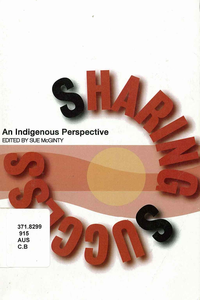Success without inclusion: is real change in sight?
Tripcony, Penny (2003) Success without inclusion: is real change in sight? In: McGinty, Sue, (ed.) Sharing Success: an Indigenous perspective. Common Ground Publishing, Altona, VIC, Australia, pp. 33-51.
![[img]](https://researchonline.jcu.edu.au/14397/1.hassmallThumbnailVersion/7451%2C_7452%2C_7453%2C_14379%2C_15398__McGinty_et_al_2003_Book_Cover.jpg)
|
Image (JPEG) (Front Cover)
- Cover Image
Download (73kB) |
|
|
PDF (Published Version)
- Published Version
Restricted to Repository staff only |
Abstract
My work in Aboriginal and Tones Strait Islander education started out as a coincidence (although our old people tell us there is no such thing as "coincidence"), then developed into a passion ... and as luck would have it, has become a career. I mention" luck" because I regard myself as" lucky" to have done, and to continue to do, what gives me great pleasure and an exhilarating sense of achievement. I've witnessed the growth and development of others during that process- people I have worked with and supported over the years-who are now accomplished professionals. Some of them have chosen pathways in education administration where a few have reached senior levels; others are continuing with quality teaching, curriculum development. academia and industrial relations. Most importantly, it is with both pleasure and pride that I see more of our young people completing school, studying at and graduating from universities, colleges and institutes (where they are joined by increasing numbers of mature-aged students), and taking up positions where they can progress towards a positive future for themselves and for Aboriginal and Torres Strait Islander people generally.
It was thirty years ago (1972) that I first learnt of the availability of Aboriginal study grants' from a woman I met accidentally in Melbourne. It could have been because her name was also Penny that we became friends; and coincidentally, she worked as an Education Officer in the Aboriginal section of the Commonwealth Department of Education (now Department of Education, Science and Training). In the course of one of our conversations, 1 told Penny that I had left school at Year 10 but a1 ways wanted to continue my education. Of course, she encouraged me to do so ... and to apply for an Aboriginal study grant. I sat the aptitude tests (a requirement at the time) and my grant application was approved to study Year 12 as a full-time student. On successful completion, I was one of two Aboriginal students admitted to the University of Melbourne, where I gained a Bachelor of Arts degree, and went out to complete a Diploma of Education. Then my life as a formally qualified educator began.
A point I wish to make is that, had there been no Commonwealth study grants and subsequent programs since the early 1970s, I would not have returned to study at that time, and the Aboriginal and Torres Strait Islander education programs in which I later participated would not have existed. Indeed, one has to ask what the present status of Aboriginal and Torres Strait Islander people might have been without Commonwealth directions and their supporting funds. These specific policies and programs, while an essential factor in the educational achievements of Aboriginal and Torres Strait Islander people, provide a clear indication that we have not been adequately or appropriately included in the education directions of mainstream systems and institutions.
| Item ID: | 14397 |
|---|---|
| Item Type: | Book Chapter (Research - B1) |
| ISBN: | 978-1-86335-532-2 |
| Keywords: | education; indigenous |
| Related URLs: | |
| Date Deposited: | 15 Dec 2010 00:07 |
| FoR Codes: | 13 EDUCATION > 1303 Specialist Studies in Education > 130399 Specialist Studies in Education not elsewhere classified @ 100% |
| SEO Codes: | 93 EDUCATION AND TRAINING > 9399 Other Education and Training > 939901 Aboriginal and Torres Strait Islander Education @ 100% |
| Downloads: |
Total: 75 Last 12 Months: 4 |
| More Statistics |



